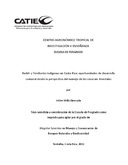Mostrar el registro sencillo del ítem
Redd + and Indigenous Territories in Costa Rica: opportunities for community development from the perspective of forest resource management
| dc.contributor.advisor | Vignola, Raffaele | |
| dc.contributor.author | Milla Quesada, V.M. | |
| dc.date.accessioned | 2014-10-20T05:34:22Z | |
| dc.date.available | 2014-10-20T05:34:22Z | |
| dc.date.issued | 2011 | es_ES |
| dc.identifier | 376864 | es_ES |
| dc.identifier.uri | https://repositorio.catie.ac.cr/handle/11554/5482 | |
| dc.description | Bib. p. 62-76 | es_ES |
| dc.description | Tesis (Mag.Sc.) -- CATIE, 2011 | |
| dc.description.abstract | El objetivo de esta investigación fue examinar el rol de los recursos forestales en el desarrollo de los pueblos indígenas de Costa Rica, en el marco de la implementación de REDD+, con énfasis en un estudio de caso del Territorio Indígena Cabécar de Tayní. La recopilación de la información sobre el territorio indígena estudiado se realizó mediante un proceso de consulta de campo involucrando a 27 miembros de la comunidad indígena, tanto representantes de la administración del territorio, como líderes familiares. Los principales hallazgos fueron que i) existen limitantes para fomentar las capacidades de gestión de comunidades indígenas debido principalmente al irrespeto a la legislación indígena, a una falta de acercamiento del gobierno en estas comunidades y a la desorganización que impera al interno de la gestión de sus territorios ii) experiencias en cuanto al manejo del recurso forestal dentro del territorio han permitido alcanzar beneficios concretos financieros y organizacionales iii) el gobierno ha dado un primer paso a través del programa REDD+ nacional para abarcar exigencias que como grupo social históricamente marginado han sido desatendidas iv) REDD+ debe considerar en sus propuestas no solamente temas técnicoscomo la deforestación o el manejo de los bosques, sino cómo la participación de comunidades indígenas es facilitada bajo estos esquemas. The objective of this research was to examine the role of forest resources in the development of the indigenous peoples of Costa Rica, within the framework of the implementation of REDD+. We used a case study of the Tayni Cabecar Indigenous Territory by conducting a consultation process involving 27 members of the territory, representing community and family leaders, as well as representatives of the civil society and govern institutions. The main findings were that i) there are limitations for building indigenous administration capacities mainly due to disrespect to indigenous law, lack of government approach in these communities and disorganization that prevails at the internal management of the territories ii) experience in the management of forest resources within the territory have helped to achieve tangible financial and organizational benefits iii) the government has taken a first step through the REDD+ national strategy to asses rights that as a social marginalized group have been neglected iv) REDD+ should consider in their proposals not only technical issues such as deforestation or forest management, but how the participation of indigenous communities is provided under these schemes. | es_ES |
| dc.language.iso | es | es_ES |
| dc.publisher | Centro Agronómico Tropical de Investigación y Enseñanza (CATIE | es_ES |
| dc.relation.ispartof | Magister Scientiae en Manejo y Conservación de Bosques Tropicales y Biodiversidad | |
| dc.subject | RECURSOS FORESTALES | |
| dc.subject | MADERA | |
| dc.subject | ORDENACION TERRITORIAL | |
| dc.subject | ORDENACION FORESTAL | |
| dc.subject | CAMBIO CLIMATICO | |
| dc.subject | GOBERNANCIA | |
| dc.subject | COSTA RICA | |
| dc.title | Redd + and Indigenous Territories in Costa Rica: opportunities for community development from the perspective of forest resource management | es_ES |
| dc.title.alternative | Redd+ y Territorios Indígenas en Costa Rica: oportunidades de desarrollo comunal desde la perspectiva del manejo de los recursos forestales | es_ES |
| dc.type | Tesis de maestría | es_ES |
| dc.identifier.publication | Turrialba (Costa Rica) | es_ES |
Ficheros en el ítem
Este ítem aparece en la(s) siguiente(s) colección(ones)
-
Tesis [3111]


